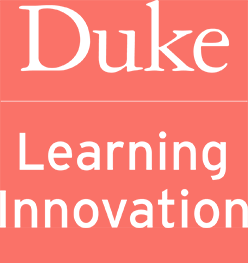Learning Innovation explores leading edge projects, partnering with faculty to gather data from Duke’s learning platforms and publishing research, and seeking grants and sponsored research opportunities to build and pilot new technologies.
Teaching and Learning Innovation Lab
This year, we launched our Teaching and Learning Innovation Lab to support research and development on teaching and learning across the Duke community with an emphasis on experimentation and translational learning research. Find out more about our Teaching and Learning Innovation Lab.
Empirical Educator Project
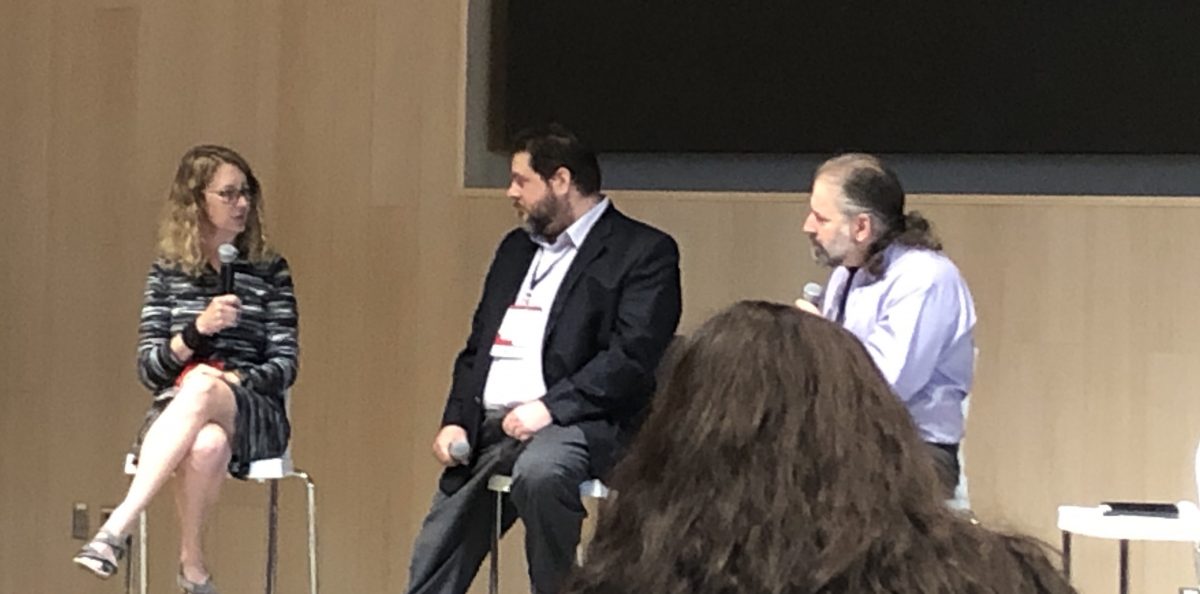
In May, Duke Learning Innovation’s Research and Development team had the opportunity to attend the Empirical Educator Project (EEP) 2019 Summit at Carnegie Mellon University. Led by Michael Feinstein, the EEP seeks to transform learning within higher education to meet 21st learning needs through collaboration between universities, colleges, and educational vendors.
During the 2019 Summit, Carnegie Mellon announced that they would be sharing the OpenSimon toolkit, which contains a $100 million open educational software package of tools for course creation and evaluation. To explore the details of the toolkit, visit CMU’s OpenSimon webpage.
As one of the first contributors to the EEP, Duke Learning Innovation shared WALTer, a template for creating consent forms for students participating in faculty-led educational research. WALTer streamlines the process of gathering consent for educational research initiatives and has been used by a number of Duke faculty members conducting research in their classrooms. To read more about WALTer, visit the EEP’s information about Educational Research Infrastructure.
Nudge
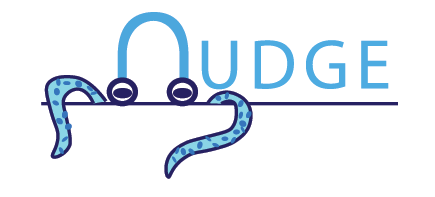
Nudge is a tool developed by Learning Innovation that enables instructors to improve students’ retention of information shared in their classes. Over the past two years several instructors have tried Nudge with their classes.
Last fall, Karen Murphy used Nudge with her students in Neuro 101: Biological Bases of Behavior, and shared anonymized class data with Kim Manturuk, a member of the Learning Innovation team and Associate Director of Research, Evaluation, and Development. This data allowed Manturuk to analyze the effectiveness of Nudge in Murphy’s class.
Manturuk’s analysis produced the following chart, which shows the distribution of the students’ final grades.
This chart suggests that Nudge participants tended to receive better grades than non-participants. However, it raises the question—could there be a correlation between Nudge participation and other factors associated with final grades, such as student motivation?
Manturuk reviewed the students’ final course grades, and used other indicators, including cumulative GPAs and standardized pre-college math test scores (ACT/SAT), to control for bias. A regression model was used, with this bias control, to estimate the relationship between Nudge and final course grades. The model’s results indicate that participating in Nudge was associated with a 1.43 percent higher final course grade.*
While this is just one analysis of one class’s experience with Nudge, Learning Innovation found it promising. Nudge will continue to be offered to a growing number of instructors in the Fall 2019 semester, and we hope some will share similar course data to help us increase our understanding of the tool’s effectiveness.
If you are interested in trying Nudge this fall, please fill out this form. Participants will receive a free Nudge t-shirt and the chance of improved student scores!
NextED Labs
Education innovators in Durham and the Triangle will have new opportunities to collaborate, thanks to a coworking program and space coming to our community called NextEd Labs at the Bullpen. NextED Labs is a partnership between Duke Learning Innovation, Duke Innovation and Entrepreneurship and Embark Projects.
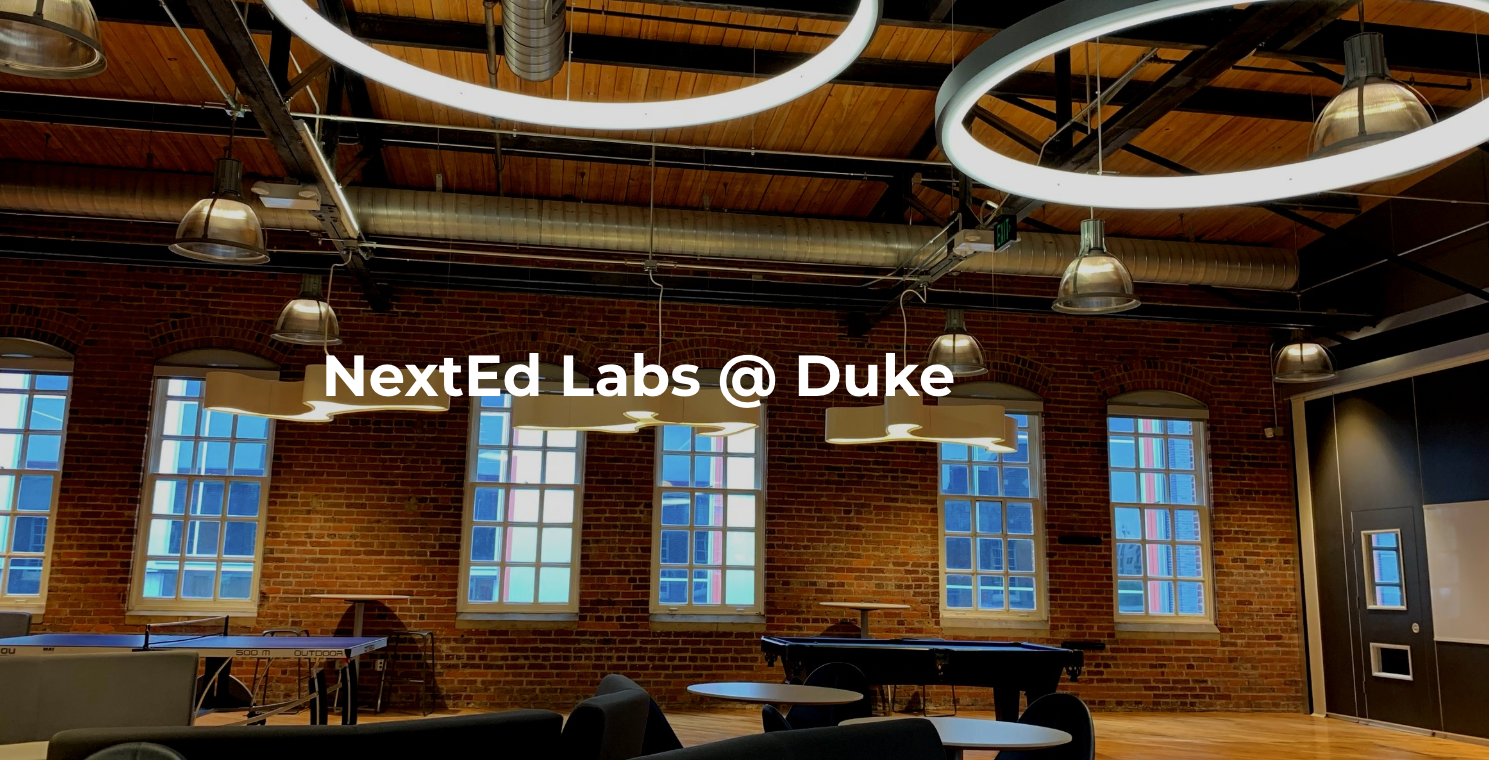 The space will support changemakers in education. It will bring together edtech firms (from startups to established companies), social ventures, Duke student projects and nonprofits to work on innovation projects that align with the educational missions of Duke and Embark.
The space will support changemakers in education. It will bring together edtech firms (from startups to established companies), social ventures, Duke student projects and nonprofits to work on innovation projects that align with the educational missions of Duke and Embark.
Sony Future Learning Collaborative
Sony announced the Future Learning Collaborative, an initiative designed to foster open and candid dialogue among higher education institutions about the role of technology in supporting teaching and learning. Duke joins ten other U.S. colleges and universities who are working together with Sony designers and researchers to develop new classroom technologies and enable more effective teaching methods with the ultimate goal of creating a deeper and more immersive learning experience for students.
Sony’s press release describes the Collaborative as follows: “The Future Learning Collaborative brings design thinking and institutional insight to bear on the development of classroom technologies that enable better outcomes and deeper learning. With support from Sony Electronics, the Collaborative facilitates dialogue among practitioners from a diverse group of 11 colleges and universities, guided by Sony’s deep experience in education technology and rich legacy of design with purpose. Together, institutional leaders and Sony designers and researchers share insights, surface best practices, and source perspectives that reflect the realities, challenges, and opportunities of education technology.”
“Our top priority is improving every aspect of instruction, which necessitates exploring the most effective uses of technology in the classroom,” said Edward Gomes, Senior Associate Dean at Duke University and a charter member of the Collaborative. “By working closely with Sony and our colleagues, we’ve created an environment that addresses our common challenges, encourages honest feedback about the development of classroom technologies, and enables educators and administrators to come together and share best practices that will shape the future of higher education.”
Work on the initiative has been underway for the several months. Representatives from Sony partnered with Duke Learning Innovation and Trinity Technology Services to held workshops on Duke’s campus on September 12 and 13 in an effort to better understand how faculty members approach active/group/experiential learning, as well as to determine some of the challenges and pain-points that they face.
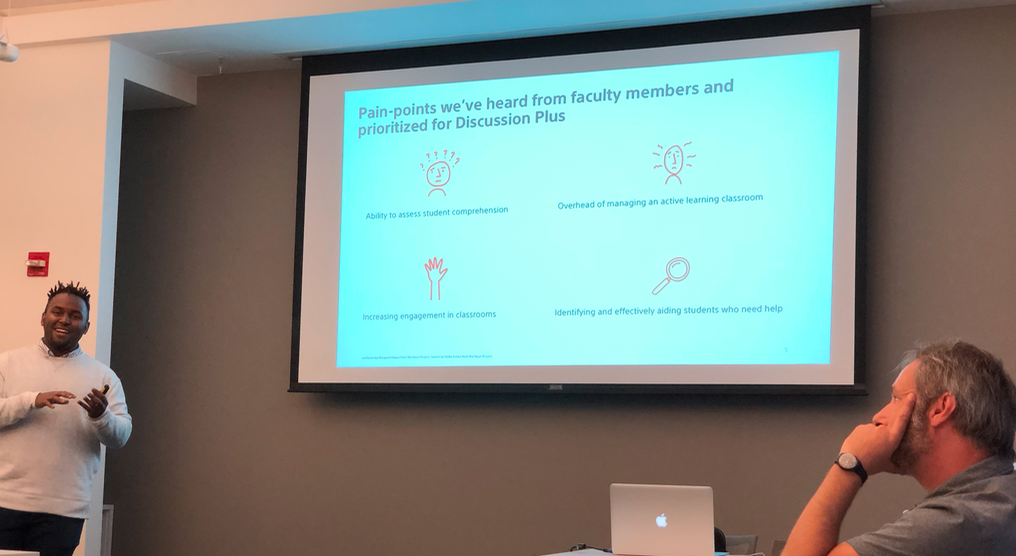
During the workshops, faculty zeroed in on the challenges of managing an active learning classroom at Duke. Specifically, they mentioned:
- the design of physical classroom spaces.
- the “overhead” involved in maintaining an active learning classroom.
- effectively measuring the quality of class discussions.
- student buy-in.
Sony has several tools in development that aim to meet some of these challenges, and the company solicited feedback on those during the workshops as well.
The Sony Future Learning Collaborative:
American University
Arizona State University
Dartmouth College
Duke University
Houston Community College
Indiana University
Montclair State University
Northwestern University
San Francisco State University
University of California San Diego
University of Central Florida
